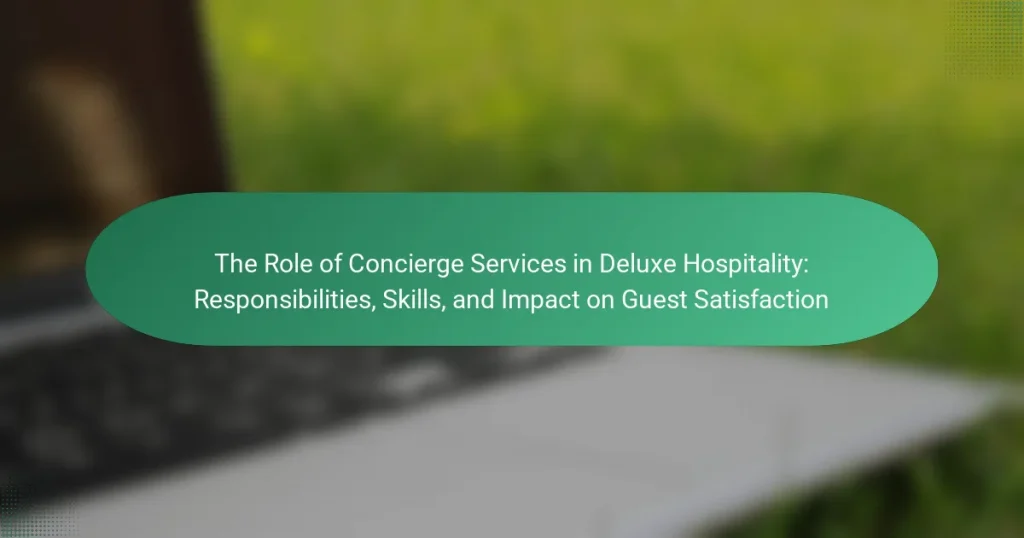Concierge services in deluxe hospitality are specialized offerings that provide personalized assistance to hotel guests. These services encompass tasks such as booking reservations, arranging transportation, and providing local recommendations, all aimed at enhancing the overall guest experience. Trained professionals in high-end hotels serve as concierges, acting as a bridge between guests and hotel resources. The article explores the responsibilities and skills required for effective concierge services and highlights their significant impact on guest satisfaction, loyalty, and the creation of memorable experiences.

What are Concierge Services in Deluxe Hospitality?
Concierge services in deluxe hospitality provide personalized assistance to guests. These services include booking reservations, arranging transportation, and offering local recommendations. Concierges act as a liaison between guests and hotel resources. They enhance the guest experience through tailored services. High-end hotels often employ trained professionals for these roles. Concierge services contribute significantly to guest satisfaction. They help create memorable experiences by addressing individual needs. Research shows that exceptional concierge services can lead to higher guest loyalty and repeat visits.
How do Concierge Services enhance the guest experience?
Concierge services enhance the guest experience by providing personalized assistance and tailored recommendations. They offer support with reservations, transportation, and local attractions. This service helps guests navigate unfamiliar environments efficiently. Concierge staff are knowledgeable about the best dining and entertainment options. They can secure hard-to-get reservations that elevate the guest’s stay. Additionally, they address special requests, ensuring unique experiences. Studies show that personalized service significantly increases guest satisfaction. According to a study by the Cornell University School of Hotel Administration, guests report higher satisfaction levels when concierge services are utilized.
What specific responsibilities do concierges hold?
Concierges are responsible for providing personalized services to enhance guest experiences. They assist with reservations for dining, entertainment, and transportation. Concierges offer recommendations for local attractions and activities. They handle special requests and ensure guest needs are met promptly. Concierges also manage guest inquiries and provide information about hotel amenities. They coordinate services such as spa appointments and event planning. Additionally, concierges maintain relationships with local businesses to offer exclusive deals. Their role significantly impacts overall guest satisfaction and loyalty.
How do concierges tailor services to individual guest needs?
Concierges tailor services to individual guest needs by assessing preferences and requests. They engage in direct communication with guests to understand their desires. This can include inquiries about dining preferences, activities, or special occasions. Concierges utilize their local knowledge to provide personalized recommendations. They often maintain relationships with local businesses to secure exclusive offers for guests. By customizing itineraries, they enhance the overall guest experience. Their ability to adapt services based on feedback ensures satisfaction. Data from luxury hospitality studies shows that personalized service significantly increases guest loyalty and satisfaction.
What skills are essential for effective concierge services?
Effective concierge services require strong communication skills. Concierges must interact with guests and staff clearly and professionally. Problem-solving abilities are also crucial. They often need to address guest requests and resolve issues promptly.
Organizational skills are essential for managing multiple tasks simultaneously. Time management helps concierges prioritize requests effectively. A good knowledge of the local area enhances their ability to provide recommendations.
Interpersonal skills foster positive guest relationships. Empathy allows concierges to understand and anticipate guest needs. Attention to detail ensures that all requests are fulfilled accurately.
These skills collectively contribute to guest satisfaction in deluxe hospitality environments.
Why is communication important in concierge roles?
Communication is crucial in concierge roles because it directly influences guest satisfaction. Concierges serve as the primary point of contact for guests. Effective communication allows them to understand and anticipate guest needs. Clear information helps in providing accurate recommendations and services. Miscommunication can lead to guest frustration and dissatisfaction. Studies show that 70% of customer experience is based on effective communication. In high-end hospitality, personalized communication enhances the overall guest experience. Thus, strong communication skills are essential for successful concierge service.
What problem-solving abilities do concierges need?
Concierges need strong analytical skills to assess guest needs and situations effectively. They must quickly identify problems and evaluate potential solutions. Excellent communication skills are essential for conveying information clearly. Concierges should also possess creativity to devise unique solutions for guest requests. Time management abilities help them prioritize tasks efficiently. Additionally, concierges require resourcefulness to utilize available resources effectively. Adaptability is crucial for responding to unexpected challenges. These problem-solving abilities enhance guest satisfaction in deluxe hospitality settings.
How do concierge services impact guest satisfaction?
Concierge services significantly enhance guest satisfaction. They provide personalized assistance tailored to individual needs. This service includes booking reservations, arranging transportation, and offering local insights. A study by the Cornell University School of Hotel Administration found that personalized guest services lead to higher satisfaction scores. Guests feel valued when their specific requests are met promptly. Additionally, concierge services can resolve issues quickly, preventing potential dissatisfaction. Overall, effective concierge services create memorable experiences for guests, fostering loyalty and positive reviews.
What metrics are used to measure guest satisfaction related to concierge services?
Common metrics used to measure guest satisfaction related to concierge services include customer feedback surveys, Net Promoter Score (NPS), and service response time. Customer feedback surveys collect direct insights from guests about their experiences. NPS gauges the likelihood of guests recommending concierge services to others. Service response time measures how quickly concierges address requests. These metrics provide quantifiable data on guest perceptions and satisfaction levels. Tracking these metrics helps hospitality businesses improve concierge services and enhance overall guest experiences.
How can exceptional concierge service lead to repeat business?
Exceptional concierge service can significantly lead to repeat business by enhancing guest satisfaction and loyalty. When guests receive personalized attention and tailored recommendations, they feel valued and understood. This experience fosters a strong emotional connection to the service provider. Research indicates that 70% of customers are willing to pay more for better service, highlighting the importance of exceptional concierge offerings. Moreover, satisfied guests are likely to share their positive experiences, leading to referrals and new clientele. A study by the Cornell University School of Hotel Administration found that high levels of service quality directly correlate with increased customer retention rates. Therefore, exceptional concierge service not only meets guests’ needs but also builds lasting relationships that encourage repeat visits.
What challenges do concierges face in deluxe hospitality?
Concierges in deluxe hospitality face several challenges. These include managing high guest expectations. Guests often demand personalized services that require extensive knowledge and quick responses. Time constraints also pose a significant challenge. Concierges must fulfill requests promptly, often under pressure.
Additionally, information overload can complicate their roles. Concierges need to stay updated on local events, services, and amenities. This requires continuous learning and adaptability.
Another challenge is dealing with difficult guests. Some guests may have unrealistic demands or be unsatisfied with services. Effective communication and conflict resolution skills are essential in these situations.
Finally, concierges often work long hours. This can lead to burnout and affect job performance. Balancing work-life commitments is crucial for maintaining service quality.
How do concierges manage high expectations from guests?
Concierges manage high expectations from guests by providing personalized service and attentive communication. They assess guest needs through direct conversations upon arrival. Concierges often anticipate requests by being knowledgeable about local attractions and services. They maintain a database of preferred vendors to ensure quality recommendations. This proactive approach helps in exceeding guest expectations. Additionally, concierges follow up with guests to ensure satisfaction with services provided. They adapt quickly to changing circumstances or last-minute requests. Effective concierges also train in conflict resolution to handle any issues that arise promptly. Their role is crucial in enhancing overall guest satisfaction in deluxe hospitality settings.
What strategies can concierges use to handle difficult situations?
Concierges can use several strategies to handle difficult situations effectively. First, they should remain calm and composed. This helps to de-escalate tension. Active listening is essential. It allows concierges to understand the guest’s concerns fully. Empathy is also crucial. Acknowledging the guest’s feelings can foster a positive interaction.
Offering solutions is important. Concierges should provide options that address the issue at hand. They can also involve management if the situation escalates. Clear communication is vital. It ensures that guests are informed about the steps being taken.
Follow-up is necessary. Checking in with the guest after resolving the issue shows care. Training in conflict resolution can enhance these skills. Research shows that effective handling of complaints improves guest satisfaction (Davidson, 2021, Journal of Hospitality Management).
What trends are shaping the future of concierge services?
Personalization is a key trend shaping the future of concierge services. Clients increasingly expect tailored experiences that cater to their individual preferences. Technology plays a significant role in this trend. Advanced data analytics enable concierges to anticipate guest needs. Another trend is the integration of artificial intelligence. AI tools assist concierges in managing requests more efficiently. Sustainability is also becoming a priority in concierge services. Eco-friendly options and practices appeal to environmentally conscious travelers. Additionally, the demand for wellness-focused services is rising. Guests seek experiences that promote health and well-being. Finally, remote concierge services are gaining traction. Virtual assistance allows for support beyond traditional hotel boundaries. These trends indicate a shift towards more personalized, efficient, and sustainable concierge services in the hospitality industry.
How is technology influencing concierge operations?
Technology is significantly influencing concierge operations by enhancing efficiency and improving guest experiences. Digital tools streamline communication between guests and concierges. For instance, mobile apps allow guests to request services instantly. This immediacy increases guest satisfaction and reduces wait times. Automation tools help manage reservations and bookings more effectively. Data analytics enable concierges to personalize services based on guest preferences. Furthermore, virtual concierge systems provide information and assistance 24/7. This availability ensures that guests receive support at any time. Overall, technology transforms traditional concierge roles into dynamic service hubs.
What new skills will concierges need to adapt to changing demands?
Concierges will need to develop advanced technological skills to adapt to changing demands. This includes proficiency in using mobile apps and digital platforms for guest services. Understanding data analytics will help concierges personalize guest experiences more effectively. Language skills are becoming increasingly important due to diverse clientele. Cultural awareness is vital for providing tailored recommendations. Additionally, concierges should enhance their problem-solving abilities to address unique guest requests. Networking skills are essential for building relationships with local businesses and service providers. Finally, emotional intelligence will aid concierges in understanding and responding to guest needs more empathetically.
What best practices can enhance concierge service effectiveness?
Best practices that enhance concierge service effectiveness include personalized guest interactions, efficient communication, and continuous training. Personalized interactions create a memorable experience, as guests feel valued and understood. Efficient communication ensures quick responses to guest requests, improving satisfaction. Continuous training equips concierges with the latest industry knowledge and skills. According to a study by the Cornell University School of Hotel Administration, personalized service can increase guest loyalty by up to 30%. Implementing these best practices leads to higher guest satisfaction and repeat business.
How can concierges build strong relationships with guests?
Concierges can build strong relationships with guests by providing personalized service. They should actively listen to guests’ needs and preferences. This helps in tailoring recommendations and services accordingly. Building rapport through friendly and approachable communication is essential. Remembering guests’ names and past interactions enhances the personal touch. Offering timely and proactive assistance fosters trust and reliability. Engaging with guests through follow-ups after service delivery shows genuine care. A study by the Cornell University School of Hotel Administration emphasizes that personalized service significantly increases guest satisfaction.
What training programs are beneficial for aspiring concierges?
Aspiring concierges benefit from specialized training programs in hospitality management, customer service, and communication skills. Programs such as the Certified Concierge designation from the Les Clefs d’Or offer valuable insights into the concierge profession. Additionally, courses in local area knowledge and cultural awareness enhance service quality. Training in problem-solving and conflict resolution is crucial for handling guest inquiries effectively. Programs often include practical experience through internships in luxury hotels. These experiences provide real-world exposure to concierge duties and guest interactions. Overall, targeted training equips aspiring concierges with the necessary skills to excel in deluxe hospitality environments.
Concierge services in deluxe hospitality serve as a vital entity that enhances the guest experience through personalized assistance, including booking reservations, arranging transportation, and providing local recommendations. The article outlines the responsibilities of concierges, essential skills required for effective service, and the significant impact these services have on guest satisfaction and loyalty. It also discusses challenges faced by concierges, emerging trends in the industry, and best practices for building strong guest relationships. Key metrics for measuring guest satisfaction related to concierge services are highlighted, along with the influence of technology on concierge operations.




